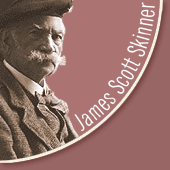




Keyword Search Results
Your search returned 10 results.
| Image | Title | Item Description |
|---|---|---|
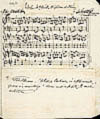 JSS0075 JSS0075 |
John McNeills Highland Fling | Manuscript of 'John McNeill's Highland Fling' (left) 'Pipe Strathspey' (right) '*J. Scott Skinner'. Skinner wrote no time signature, since it is clear that the music has 4 crotchet beats to each bar. Skinner would have to trust the engraver to add 4/4 at the beginning of each staff. In A major, the G sharp is altered to G natural to show that Skinner planned this as a pipe tune, where G natural is possible, but G sharp isn't. The music is in three two-stave systems, the top for the melody, the bottom for the accompaniment. The bass line in the second system is parallel fifths, in crotchets, over which he writes 'Real effect of drones', emphasizing the link with the pipes. Pasted over the bottom of the page is Skinner's note: *The phrase, 'Where labour is apparent, grace is wanting' does not apply to such artists. Skinner thought highly of Edinburgh-based piper and dancer McNeill. At the Sword Dance competition at Bray, Ireland, in 1862, Skinner won first prize, playing the fiddle as he danced. But he 'honestly believed (the prize) should have gone to McNeill', and offered him the purse of 'three guineas' (£3.15). As Skinner tells the story in My Life and Adventures, McNeill replied '_ye're the best man that I've seen come out of the North', and was pleased to 'ha(v)e a dram' (a measure of neat Scotch whisky) with the 19-year old winner. |
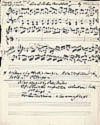 JSS0108 JSS0108 |
Lord John Campbell | Duncan McIntyre's strathspey Lord John Campbell had good memories for Skinner, who added a variation to it. His footnote says that this version is *as played by Archie Menzies. Edin(burgh) competition (22 players) 1856 - 1st prize - Also played by Peter Milne (his old friend) at A Skinner's (his brother Alexander's?) competition Aberdeen later first prize - Forbes Morrison (for whom Skinner wrote a reel) also won a prize. |
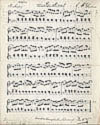 JSS0126 JSS0126 |
John Roy Stewart | Manuscript in Gavin Greig's hand of 'Strathspey John Roy Stewart [by] A. McGlashan', 'or "King" McGlashan' (in right margin). Some bars have been crossed out, and a note to the left asks if 'The first four bars carry all the melody?' Below the music is 'Arranged by G. G. [Greig]', 'an old tune there is no copyright'. The initials 'A. T.' at the end of the music show that Alexander Troup has seen the music, and presumably approves. |
 JSS0148 JSS0148 |
John Marshall | Manuscript in Skinner's hand of his 'Strathspey'. John Marshall (b. 1844), from Methlick, Aberdeenshire, was a 'neat and skilfull repairer', in Aberdeen. He made at least 150 violins based on the Stradivari model. His shop assistant was Miss Shepherd (See JSS0149). |
 JSS0564 JSS0564 |
Page 1 of 2, Table of Contents, John Niven Collection | John Niven's collection dates from 1761, the year before Francis Peacock's Fifty Favourite Scotch Airs (JSS0559) appeared. Niven may have copied from printed music collections, perhaps belonging to friends. Or he could have written down tunes which he had learned by ear, as seen in the James Christie MS 1730-1760. Niven, a wealthy Jacobite sympathiser, lived in what is now known as Provost Skene's House, one of the oldest houses in Aberdeen. Niven's 70 pages of music include 227 tunes, some published by Robert Bremner, and James Oswald. |
 JSS0565 JSS0565 |
Page 2 of 2, Table of Contents, John Niven Collection | Collection of music 'July 11 1761' transcribed by John Niven. Niven, a wealthy Jacobite sympathiser, lived in what is now known as Provost Skene's House, one of the oldest houses in Aberdeen. Niven's 70 pages of music include 227 tunes, some published by Robert Bremner, and James Oswald. Pasted at bottom right is an Aberdeen Press and Journal clipping [23 March 1933] from Niven's great-grand-daughter, concerned about the possible demolition of Niven's home. The Duke of Cumberland was billeted there in 1746, during the Jacobite War. Perhaps Niven had been his willing - or unwilling - host. |
 JSS0566 JSS0566 |
Title page, John Niven Collection | Collection of music 'July 11 1761' transcribed by John Niven. Niven, a wealthy Jacobite sympathiser, lived in what is now known as Provost Skene's House, one of the oldest houses in Aberdeen. Niven's 70 pages of music include 227 tunes, some published by Robert Bremner, and James Oswald. The '1st part Sett by Alexr Fraser Aberdeen'. His title page reads 'Inflamed by Musick Soldiers fight / Inspired by Musick Poets write / Musick can heal the Lovers wound / And calm fierce raging by gentle sound / Philosophy attempts in vain / What Musick can with ease attain.' |
 JSS0567 JSS0567 |
Rudiments of Music, John Niven Collection | Collection of music 'July 11 1761' transcribed by John Niven. Niven, a wealthy Jacobite sympathiser, lived in what is now known as Provost Skene's House, one of the oldest houses in Aberdeen. Niven's 70 pages of music include 227 tunes, some published by Robert Bremner, and James Oswald. This page shows scales and notes for learning to read music, and is similar to Catharine Moir's (JSS0547). The handwritten section discussed bowing, so Niven was presumably a fiddler. |
 JSS0736 JSS0736 |
Mr John Brown | John Brown found fame as Queen Victoria's Scottish aide. Skinner, who had taught dancing at Balmoral, knew Brown well. |
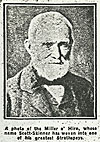 JSS0834 JSS0834 |
Image of John Johnston, The Miller of Hirn | John Johnston, the Miller of Hirn, inspired one of Skinner's best known strathspeys (JSS0723). The Miller was a friend of Skinner's father. Skinner also wrote strathspeys dedicated to the Miller's wife and son. |


Historic Collections · Kings
College · Old Aberdeen · AB24 3SW
Tel:(0)44 1224 274312 · E-mail: scottskinner@abdn.ac.uk
Page design by IT Services Web Team